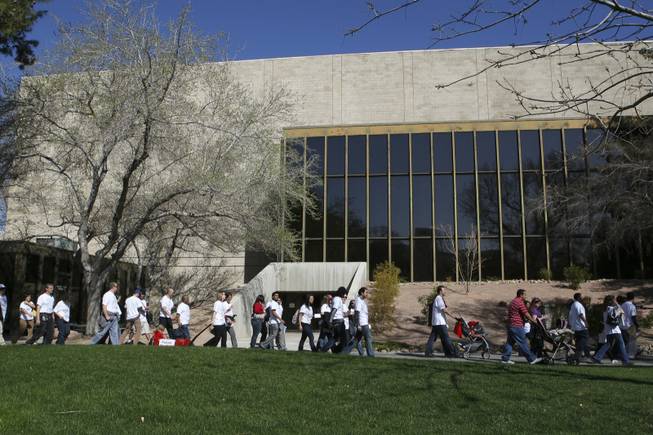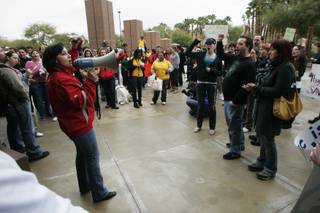
Mona Shield Payne / Special to the Sun
Students, alumni and staff march through the UNLV campus chanting in support of the Engineering Department during a budget rally Friday, March 5.
Tuesday, July 27, 2010 | 2:01 a.m.
Please don't go
In the past six months, at least five UNLV faculty members have received offers from other institutions. To find ways to keep faculty on campus, a series of meetings has been organized. Suggestions have included new seed grants and increased acknowledgment of faculty accomplishments.
Sun Archives
- UNLV president driven despite harsh cutbacks (7-1-2010)
- Nevada regents approve cuts to higher education (6-4-2010)
- UNLV surpasses goal, raises $537 million in campaign (2-11-2010)
=
As UNLV copes with current budget cuts and the possibility of new cuts when the state Legislature meets again next year, the administration and the faculty worry:
How can they keep women and minorities from being poached by other institutions?
It won’t be easy.
Across the country, a similar question troubles universities, public and private. But to UNLV, hit with some of the harshest cuts in higher education, the question is especially urgent.
Students in Nevada’s public schools — the pipeline for much of UNLV’s 28,000 undergraduate and graduate students — are more diverse every year, coming from dozens of ethnic groups and speaking scores of languages.
And UNLV, without the big endowment of Harvard or the national reputation of the University of California, Berkeley, must find new ways to keep its faculty members, regardless of gender or ethnic group, from circulating their resumes.
In the past six months, according to the administration, at least five faculty members have received offers from other institutions. Of these, one was of Asian heritage and the other black.
The issue is stirring emotions at faculty meetings.
At one session, sitting in a circle of chairs in a student-union conference room, were a dozen faculty members who are black, Hispanic, Native American, white and those whose multi-ethnicity was not immediately apparent.
Some suggested that seemingly small things, like “seed” grants, might help win far larger federal grants. The resulting research projects might keep faculty from leaving. Others felt that acknowledgment of faculty accomplishments and other non-monetary rewards would help.
Still others felt reaching out to the community and demonstrating the university’s prowess would strengthen bonds ever further. Daniel Ortega, 41, gave an example.
He is an associate professor of landscape architecture and has been on the UNLV faculty for 10 years. A few years ago, Ortega said, his department donated a design plan, complete with assessment of water mains and other complex studies, to an assisted-living center for its community garden. A private contractor would have charged $40,000, Ortega said.
“We need to market community support,” Ortega said at the meeting, “so we’re not always connecting just in a survivor psyche and will-the-target-be-on-my-back-next.”
The meeting was the second of three, open to all faculty. Provost Michael W. Bowers, the academic officer overseeing faculty and curriculum, organized it.
“We need to keep people here before they start looking,” Bowers told the faculty. “If you start looking, you’ve got one foot out the door.”
About 100 faculty positions spread across 60 departments are now vacant, he said. And it is unclear whether more positions may go unfilled or current faculty will be laid off if new cuts come when the Legislature, which oversees UNLV’s budget, reconvenes in February.
UNLV’s budget this year is about $480 million, although the numbers aren’t final.
But state funding has fallen from the peak in 2009 by more than a quarter to $172.4 million. (The rest of the funding comes from external grants, contracts and other sources.)
For students, the vacant faculty positions can disrupt their class schedules. For example, theater history, a required class for graduation as a theatre major, may not be taught both semesters for lack of an instructor.
Robert Brewer, 64, a theater professor who has been at UNLV for 22 years, said after the meeting that budget cuts mean that “not everything will be taught at a time when students want it.”
For the faculty without tenure, which means a permanent position after a probationary period, the cuts mean vertigo.
Rayme Cornell, 41 and black, said during the meeting, “I’m happy to have a job but there comes a point ...” and her voice trailed off, as colleagues nodded their heads.
Martin Schiller, 46, white and an associate professor in the school of life sciences, told her, “That’s the danger. You’re on the path to leaving.”
Cornell, who is a full-time artist in residence in the theater department and a graduate of UNLV, continued, “I believe that hard work alone is rewarding and will be rewarded.”
But Cornell said she was troubled when a retired woman professor, who is black and visiting from another university, recently told her, “that’s not always so, not in higher education.”
Markie Blumer, 35, assistant professor in the department of marriage and family therapy, has a father of Norwegian heritage and a mother of Mexican and Apache heritage. Blumer also describes herself as bisexual.
“With my blond hair,” she told the others, “I’m not a visible minority.”
Later, she said she felt compelled to come to the faculty meeting as a woman, as someone with a varied ethnic background, and as “a sexual minority.”
But there is something beyond the faculty anxiety, Carolee Dodge Francis executive director of the American Indian Research and Education Center, said after the meeting. A diverse faculty benefits the larger university community, said Dodge Francis, a public-health professor.
“I was a rez girl, I was never supposed to go to college,” said Francis, an Oneida Indian who grew up on the Menomini reservation in Wisconsin.
“We never had enough resources, we were always pooling our resources to go forward” on the reservation, she said. “If you didn’t get by, you were never going to succeed.
“Now we’re trying very hard to be a competitive university. We have to get by and we have to succeed.”


Join the Discussion:
Check this out for a full explanation of our conversion to the LiveFyre commenting system and instructions on how to sign up for an account.
Full comments policy